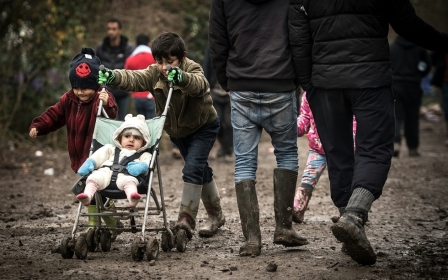Syrian asylum seekers arrive in UK from Calais after landmark ruling

Four Syrian asylum seekers arrived in Britain late on Thursday from a refugee camp in Calais after a landmark court ruling which could see more crossing the Channel.
Family members greeted them as they arrived by train at St Pancras station in central London, where a crowd of about 100 demonstrators stood with yellow balloons and banners reading "Refugees welcome".
It came after judges on a British immigration tribunal on Wednesday ordered the Home Office to allow the four to enter Britain while their asylum claims are considered.
The three teenagers and a 26-year old with mental health problems had been living in the Calais camp, referred to by some as "the Jungle", for over two months.
Lawyers argued conditions there were "intolerable" and that their cases should be handled in Britain due to bureaucratic delays.
One 17-year-old, who had an emotional reunion with his older brother at the train station, said he was grateful for the legal efforts to bring him to Britain.
"I feel so thankful because I would never have imagined I would be reunited with my brother," said the teenager, who cannot be identified for legal reasons.
"I want to thank the lawyers who went that extra mile to reunite me and my brother. I feel so thankful."
Ahmed, 26, an older brother of one of the boys who would not give his real name to protect his sibling, said he fled the Syrian civil war and had not seen his brother in two years.
"He is the youngest in my family and I haven't seen him in a long time," Ahmed said ahead of his brother's arrival.
"It is hard to describe how happy I felt when I heard the court's ruling yesterday. It was really, really amazing. It was everything I was waiting for."
The tribunal judges cited European Union legislation, under which those who have a relative living legally in another European country have a legal entitlement to apply to seek asylum there.
Under the rules, asylum seekers should first claim asylum in France, but the judges agreed that bureaucratic failures meant this rarely happened, and that evidence of a written claim to asylum in France was sufficient.
"This judgement highlights that there are safe, legal routes to reconnect families... and we hope will allow other families to be reunited," said George Gabriel of Citizens UK, which was involved in the legal action.
The Home Office must now examine claims brought by refugees who have not yet received asylum in France, paving the way for further claims if other vulnerable asylum seekers can prove they have links to Britain.
It said it would "study the full judgement in detail" before making its next move, which may include an appeal.
"We stand by the well-established principle that those seeking protection should claim asylum in the first safe country they reach," it said in a statement.
"Any request to unite family members under the Dublin Regulation is carefully considered. Where someone seeking asylum elsewhere in the EU can demonstrate they have close family members legally in the UK, we will take responsibility for that claim."
The tribunal's full judgement on the fate of the four asylum seekers is expected "within two weeks".
On Wednesday a 41-year-old British woman was jailed in France for attempting to smuggle a 15-year-old Syrian boy into the UK.
The woman was handed a one-year sentence, with nine months of the term suspended, for hiding the boy in the boot of her car in an attempt to get him onto a cross-Channel ferry.
She was apprehended by French authorities at the northwestern port of Dieppe before they could board the vessel to Newhaven on Britain's south coast.
Stay informed with MEE's newsletters
Sign up to get the latest alerts, insights and analysis, starting with Turkey Unpacked
Middle East Eye delivers independent and unrivalled coverage and analysis of the Middle East, North Africa and beyond. To learn more about republishing this content and the associated fees, please fill out this form. More about MEE can be found here.




